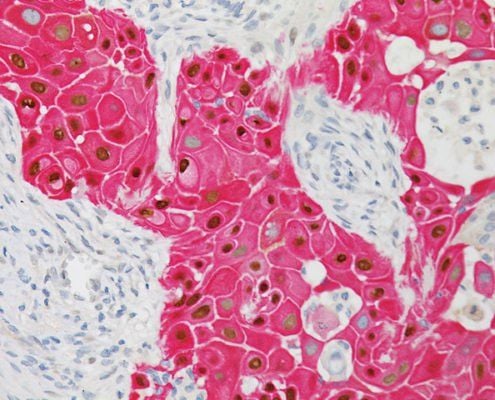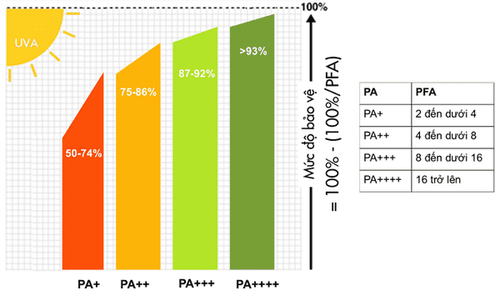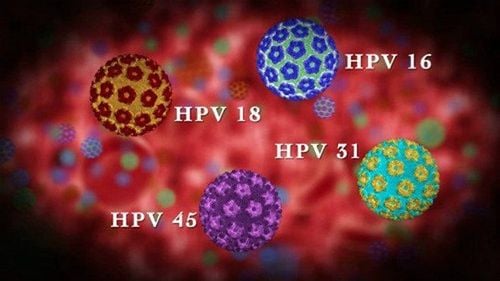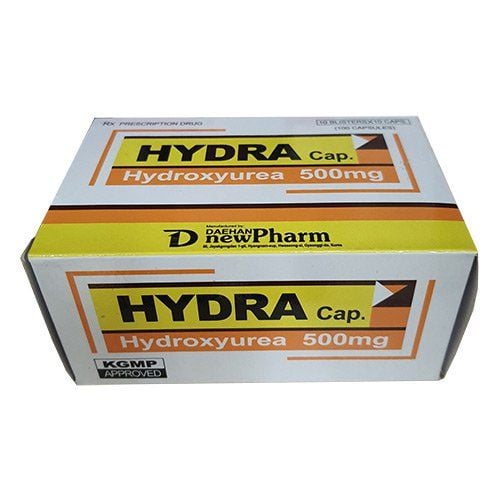This is an automatically translated article.
The article was professionally consulted by MSc Do Thi Hoang Ha - Doctor of Biochemistry, Laboratory Department - Vinmec Hai Phong International General HospitalSquamous cell carcinoma is a fairly common type of skin and mucosal cell cancer today. If not diagnosed early, the disease can be life-threatening. To diagnose this pathology, there is now a relatively specific biomarker called SCC. So what is the SCC test and what role does it play in squamous cell carcinoma?
1. Brief definition of squamous cell carcinoma
Squamous epithelium is a major component of the epidermis, but it is also present in the stroma of the gastrointestinal tract, lungs, and other areas of the body.Squamous cell carcinoma is a malignancy that begins in the squamous cells. This is one of the skin cells that make up the epithelial layer that covers the entire surface of the body, so squamous cell carcinoma is the predominant form of skin cancer. However, squamous cells are also considered as a component in the surface mucosal cells of many other organs such as the lungs, digestive tract, bladder, vagina, cervix, prostate... Therefore, squamous cell carcinoma can also appear in many different regions of the body with different manifestations in terms of clinical symptoms, history, prognosis, and response to treatment.
The squamous cell layer is responsible for protecting the surface of the skin or lining the inside of the body's internal organs. The characteristic feature of this cell type is the ability to rapidly regenerate, so that they are regularly shed to be replaced by new skin and mucosal cells.
The cause of squamous cell carcinoma is often related to genetic and DNA mutations. Several risk factors can lead to mutations:

Therefore, this is a dangerous cancer and can cause many serious complications for patients if not diagnosed and treated promptly. Currently, with the advancement of medicine, a test that increases the possibility of diagnosing this pathology is the SCC test.
2. What is the SCC test - when is it ordered?
SCC or SCCA is a squamous cell carcinoma antigen, which is a glycoprotein with a molecular weight of about 48 kDa. SCC is produced by squamous cells and belongs to the serine/cysteine protease inhibitor class (SCC 1 and 2). Despite having the same name, squamous cell carcinoma, SCCs in different locations have great differences in symptom presentation, prognosis, and response to treatment.
SCC test is indicated in cases where the patient has the following clinical signs that are suspicious of squamous cell carcinoma:
The skin is covered with many red patches, burning pain and accompanied by scabs. Especially the lesions will be redder and more peeling when exposed to the sun for a long time, in some severe cases may ulcerate or bleed; Oral mucosa with white patches, ulcers; The genitals appear sore and painful. Unusual vaginal discharge, painful sex or bleeding; Skin discoloration, reduced skin elasticity and appearance of more wrinkles. However, the above signs are often non-specific and progress slowly, creating subjective psychology for patients. Therefore, to ensure health, when experiencing the symptoms on the patient should see a doctor to get the most accurate diagnosis.
3.Meaning of the SCC . test
Elevated SCC test helps diagnose squamous cell carcinomas in different organs as well as predict the likelihood of treatment response, recurrence and survival prognosis of patients:Cervical cancer Uterus: Up to 45-83% of patients with cervical squamous cell carcinoma have a significant increase in blood levels of SCC. In particular, in patients who relapsed after treatment, the SCC test value also increased, seen in 66-84% of patients. Skin cancer: An increased SCC test is associated with skin signs such as red, often itchy bumps, scabs, or ulcers of unknown cause, especially in people with frequent sun exposure. often; Lung cancer: About 39-78% of cases of squamous cell carcinoma of the lung have an increased level of SCC; especially in non-small cell lung cancer. Lung SCC is more strongly associated with smoking history than other lung cancers. Nasopharyngeal and esophageal cancers: 90% of head and neck cancers are squamous cell, originating in the mucosal (epithelial) membranes of these areas. SCC levels increase in different degrees depending on the stage of squamous cell carcinoma in the nasopharynx and esophagus. In patients with small tumours, serum levels of SCC were associated with lymph node metastases at significantly higher concentrations than in node positive patients. The sensitivity of SCC in these cancers is 34-78%. Bladder, penile cancer: Plasma SCC increased in 45% of penile cancer cases and was seen in some patients with urethral cancer; Colorectal cancer, gastric cancer: SCC test in these conditions can increase in about 20%, especially in anal cancer the sensitivity of SCC test is about 76%.

Cirrhosis : Seen in about 6-10% of cirrhotic patients may have increased blood SCC; Pancreatitis; Renal failure: About 44-78% of patients can have an increase in SCC test and the degree of increase in SCC is proportional to the level of serum creatinine; Benign lung diseases: chronic bronchitis, chronic obstructive pulmonary disease, pulmonary tuberculosis also have a slight increase in SCC test index Benign gynecological diseases; Ear, nose and throat diseases (21% of patients) Skin diseases such as psoriasis, dermatitis, pemphigus or eczema (80% of patients have slightly elevated levels of SCC) Some benign tumors: Found in about 46% patient.
4. How to prevent squamous cell carcinoma?
Patients can completely prevent squamous cell carcinoma by the following ways:Limit sun exposure, especially between 10 a.m. and 2 p.m. The reason is that at this time the sunlight contains a lot of ultraviolet rays, which are very harsh and harmful to skin cells; If working or walking in the sun, it is necessary to apply full sunscreen, with an SPF of about 30+ along with other sun protection measures such as long sunscreen, hat, and sunglasses to avoid ultraviolet rays. .

Currently, Vinmec International General Hospital has been and continues to be fully equipped with modern diagnostic facilities such as: PET/CT, SPECT/CT, MRI... biology, immunohistochemistry, genetic testing, molecular biology testing, as well as a full range of targeted drugs, the most advanced immunotherapy drugs in cancer treatment. Multimodal cancer treatment from surgery, radiation therapy, chemotherapy, hematopoietic stem cell transplantation, targeted therapy, immunotherapy in cancer treatment, new treatments such as autoimmunotherapy body, heat therapy...
After having an accurate diagnosis of the disease and stage, the patient will be consulted to choose the most appropriate and effective treatment methods. The treatment process is always closely coordinated with many specialties: Diagnostic Imaging, Biochemistry, Immunology, Cardiology, Stem Cell and Gene Technology; Department of Obstetrics and Gynecology, Department of Endocrinology, Department of Rehabilitation, Department of Psychology, Department of Nutrition... to bring the highest efficiency and comfort to the patient. After undergoing the treatment phase, the patient will also be monitored and re-examined to determine whether the cancer treatment is effective or not.
Especially, now to improve service quality, Vinmec also deploys many cancer screening packages that can help customers detect cancer early before there are no symptoms, bringing a better prognosis. treatment and a high chance of recovery.
Please dial HOTLINE for more information or register for an appointment HERE. Download MyVinmec app to make appointments faster and to manage your bookings easily.














